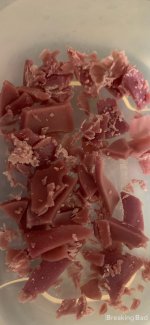- Language
- 🇬🇧
- Joined
- Feb 22, 2023
- Messages
- 340
- Reaction score
- 297
- Points
- 63
The problem with l-PAC is that it racemizes quick to d/l-PAC what yields not the wanted l-Ephedrine but d/l-ephedrine what in consequence leads to racemic Meth as made from P2P.
We want d-Meth or at least predominantly d-Meth.
Two factors drive racemisation of l-PAC: First alkaline environment, say the presence of bases of any kind and transition metal ions, say any salts of iron etc. present even in minuscule amounts as they work catalytically.
Now many reduction systems are alkaline as is NaBH4, so its clear what would happen. Therefor besides storing and handling the l-PAC properly and adding something like oxalic acid and/or stannic acid or EDDA to take care of any metal salts around one chooses an acidic reduction system or one which works in slightly acidic conditions at least. I would recommend to use STAB whats an acidic derivative of NaBH4 and works especially well in reductive aminations. Methylamine is then used as the acetate, say the acetic acid salt of methylamine and all together as one pot one go Imine formation/Imine reduction whats called reductive amination.
Information on how to make STAB from NaBH4 and GAA is all over the net and also on how to use it. Yields are excellent.
Zinc-Borohydride would be another easily prepared possibility if one has anhydrous ZnCl2.
Al/Hg is also possible bust it must be done in THF or diethylether.
But a native acidic system as STAB or Zinc-Boro is best.
l-PAC production from Benzaldehyde by biosynthesis is not necessarily difficult but it is more of a technical challenge for the large volumes to handle. And first of all one has to find a good strain of yeast for the purpose. With this at hand it is mainly a problem of extracting the l-PAC at the end, a continuous extraction system is a must have here and ether is the solvent of choice.
good luck!
We want d-Meth or at least predominantly d-Meth.
Two factors drive racemisation of l-PAC: First alkaline environment, say the presence of bases of any kind and transition metal ions, say any salts of iron etc. present even in minuscule amounts as they work catalytically.
Now many reduction systems are alkaline as is NaBH4, so its clear what would happen. Therefor besides storing and handling the l-PAC properly and adding something like oxalic acid and/or stannic acid or EDDA to take care of any metal salts around one chooses an acidic reduction system or one which works in slightly acidic conditions at least. I would recommend to use STAB whats an acidic derivative of NaBH4 and works especially well in reductive aminations. Methylamine is then used as the acetate, say the acetic acid salt of methylamine and all together as one pot one go Imine formation/Imine reduction whats called reductive amination.
Information on how to make STAB from NaBH4 and GAA is all over the net and also on how to use it. Yields are excellent.
Zinc-Borohydride would be another easily prepared possibility if one has anhydrous ZnCl2.
Al/Hg is also possible bust it must be done in THF or diethylether.
But a native acidic system as STAB or Zinc-Boro is best.
l-PAC production from Benzaldehyde by biosynthesis is not necessarily difficult but it is more of a technical challenge for the large volumes to handle. And first of all one has to find a good strain of yeast for the purpose. With this at hand it is mainly a problem of extracting the l-PAC at the end, a continuous extraction system is a must have here and ether is the solvent of choice.
good luck!
- Language
- 🇬🇧
- Joined
- Jan 9, 2024
- Messages
- 69
- Reaction score
- 45
- Points
- 18
when the fermentation or condensation is finished is there a need to make the broth nuetral or slightly alkaline for the ether to pick up the l-pac
- Language
- 🇺🇸
- Joined
- Apr 16, 2023
- Messages
- 138
- Reaction score
- 85
- Points
- 28
Once the yeast has been removed from the brew mixture, the phenylpropanol-l-one-2 can be extracted out of the solution. The original references used ether to do the extraction. I would suggest substituting
hardware store toluene. Several extractions with a few hundred ml portions of toluene should be enough
to completely remove the product.
hardware store toluene. Several extractions with a few hundred ml portions of toluene should be enough
to completely remove the product.
- Language
- 🇬🇧
- Joined
- Jan 9, 2024
- Messages
- 69
- Reaction score
- 45
- Points
- 18


